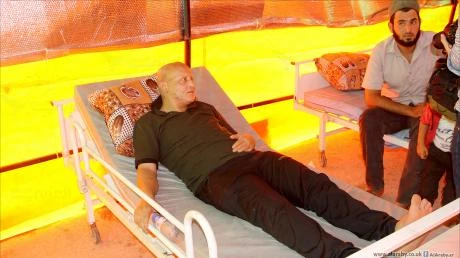On September 30, 2023, a historic moment unfolded as the inaugural radiological device dedicated to treating cancer patients made its entry into northwestern Syria. This significant development came to fruition at the “Al-Hammam” crossing, situated near the city of Jindires in Afrin’s countryside, marking the culmination of years of relentless advocacy to bring this critical medical asset to the region.
This event was made possible through generous funding from Sweden and meticulous coordination with the Turkish Ministry of Health, facilitated by the Al-Amin Organization for Humanitarian Support.
In an interview with Al-Souria.net, Dr. Muhammad Haji, the director of Afrin Health, expressed that this radiological device would find its new home at Afrin National (Military) Hospital. Operational oversight will be shared between the Al-Amin Organization and the Health Directorate of Afrin, along with support from a Turkish health team.
Furthermore, the region is gearing up to welcome three additional radiological devices, which will be distributed to cities such as Al-Bab and Idlib, bolstering cancer treatment capabilities in the area.
The Al-Amin Organization celebrated this milestone on social media, hailing it as a momentous leap forward in cancer patient care within liberated regions. This advanced device will significantly reduce the need for patients to endure prolonged waiting times and travel to Turkey for radiotherapy. Its precise targeting of tumours, both benign and malignant, will offer hope for improved treatment outcomes.
The organization revealed that the device would be housed in a dedicated facility and initially operated by foreign specialists from the manufacturer. However, Syrian healthcare professionals will undergo training to operate the device autonomously in the near future.
The total value of this state-of-the-art radiological device, as indicated by the organization, exceeds three million euros.
This achievement follows months of tireless advocacy efforts by activists who rallied support for cancer patients, especially after Turkish authorities restricted entry following a seismic event in February. Subsequently, after organizing a protest near the Bab al-Hawa crossing, Turkish authorities permitted patients to enter starting July 26.
According to statistics from the “Cancer Does Not Wait” campaign, the region has approximately 3,000 cancer cases. With the absence of radiological devices in local medical facilities, Turkey had been the sole destination for these patients seeking treatment.
This article was translated and edited by The Syrian Observer. The Syrian Observer has not verified the content of this story. Responsibility for the information and views set out in this article lies entirely with the author.


